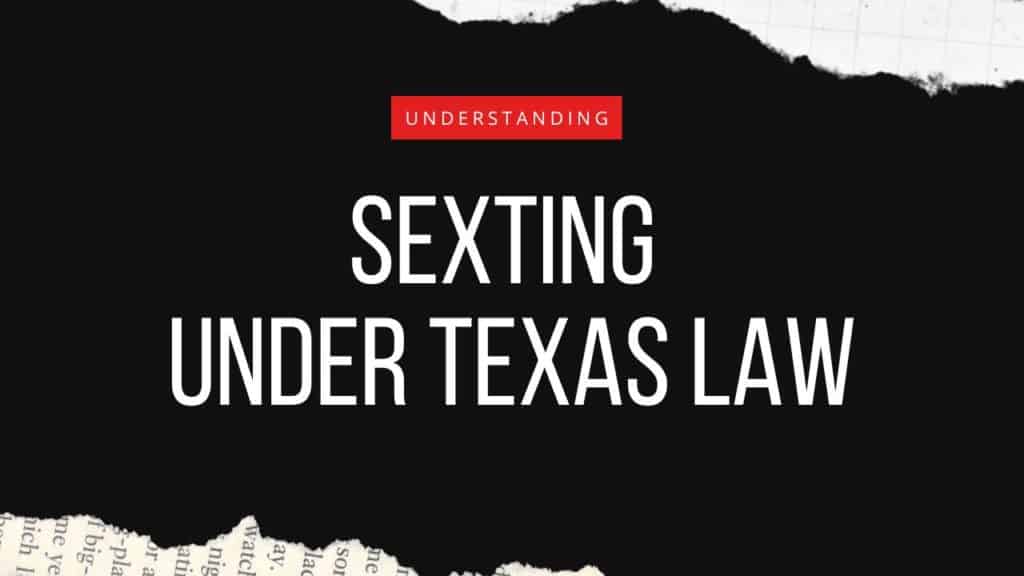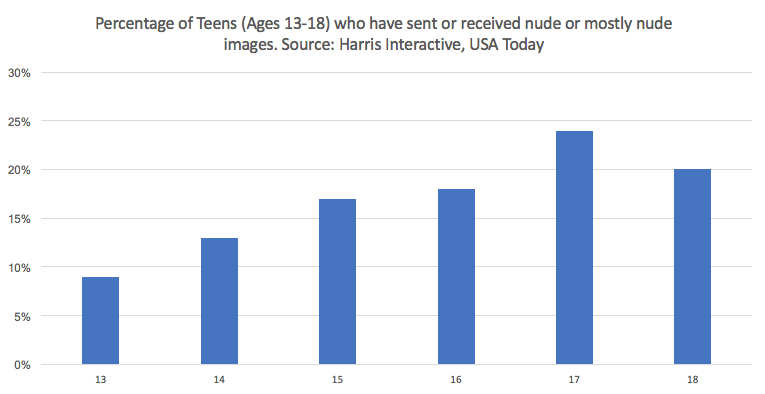Sexting Laws In Texas | Display Of Harmful Material To A Minor
Understanding Sexting Laws in Texas
Sexting is sending sexually explicit messages and images to another person, primarily between mobile phones. The term, derived from the words “sex” and “texting,” is very common. Over the years, there has been much controversy about how prolific sexting has become, especially among teenagers and young adults. But is sexting a crime?
Is Sexting Illegal?
Sexting is not illegal when photos are shared between consenting adults. However, there are a variety of ways that sexting can be illegal under state and federal law, especially if one or both participants are minors. This article explores state and federal criminal charges that could arise from sexting.

Unsolicited Dick Pics in Texas
Penal Code 21.19 makes it a Class C misdemeanor to send visual material (without the express consent of the recipient or at their request) that depicts:
- A person engaging in sexual conduct
- The person’s intimate parts exposed, or
- The covered genitals of male in a “discernibly turgid state.”
In other words, an unsolicited dick pic is a criminal offense in Texas. That includes a dick pic that is not exposed, but the penis is hard.
Harassment
Imagine this scenario: two consenting adults exchange pictures of a sexual nature, which is perfectly legal. Then, they break up, and the split is not amicable. If one of the individuals repeatedly sends the other vindictive texts and now embarrassing photos to the other, such actions may fall precisely within the definition of harassment under Texas law. This is generally a Class B misdemeanor in Texas. Additionally, harassment charges can stem from obscene statements. Obscene means a “patently offensive description of or a solicitation to commit an ultimate sex act.” Learn more about harassment charges in Texas.
Revenge Porn in Texas
Texas’ so-called “Revenge Porn” statute, Section 21.16 of the Penal Code, makes it a Class A misdemeanor to disclose or promote intimate visual material under three different scenarios: intentionally disclosing visual material of another, threatening to disclose intimate visual material, and promoting intimate visual material.
Sexting in Texas – Minors Depicted
The most obvious way a teenager – or anyone for that matter – can get into trouble is to send or receive a sexually explicit photo of a person under the age of 18. Under the PROTECT Act of 2003 (Prosecutorial Remedies and Other Tools to end the Exploitation of Children Today), it is a federal offense to distribute, receive, or possess any image of a minor engaged in sexual activity. Such actions can be prosecuted federally under 18 USC 2252 and 18 USC 2252A.
Under Texas state law, sending a nude image to someone under the age of 18 can be prosecuted under Penal Code 43.24, which criminalizes the sale, distribution or display of harmful material to a minor. Meanwhile, possession of child pornography can be prosecuted under Penal Code Section 43.26.
It’s important to point out that a minor who sends or receives sexually explicit images to another minor can also be prosecuted, but the charge will be a Class C misdemeanor instead of a felony.

Learn more about child pornography charges and sentencing in federal child porn cases.
Online Solicitation of a Minor
Online solicitation of a minor occurs when a person uses the Internet to set up a meeting with a minor. It does not matter if the meeting did not occur, the meeting was never meant to occur, or if the accused was only fantasizing about a meeting occurring. These cases are often filed as a result of a sting operation or a parent discovering their child’s online activity. Learn more about Online Solicitation of a Minor.
Criminal Solicitation of a Minor
Criminal Solicitation of a Minor is a distinct charge from Online Solicitation of a Minor. Criminal Solicitation of a Minor occurs when a person solicits a minor to engage in a 3g offense or Child Sex Trafficking (Penal Code 20A.02), Continuous Sexual Abuse of Young Child or Children (Penal Code 21.02), Indecency with a Child (Penal Code 21.11), Sexual Assault (Penal Code 21.011), Aggravated Sexual Assault (Penal Code 21.021), Prostitution (Penal Code 43.02), Compelling Prostitution – Underage (Penal Code 43.05), and Sexual Performance by a Child (Penal Code 43.25.) A minor in this section is anyone under the age of 17.
Is Snapchat (or the latest app or website) safe for sexting?

Apps like Snapchat and Dust seek to provide greater protection to their users. Of these apps, we see images from Snapchat during criminal investigations more than almost any other app. These images come from screenshots, workarounds, or recordings of “stories.” Dust, unlike most other apps, does not send messages through hard-drive-based servers; and instead messages only hit a server’s RAM or memory that is not saved on a computer. Remember that nothing is secure. Just like a face-to-face conversation could be recorded, a person could record a conversation happening on Dust by taking pictures of the images as they come through using a different device to avoid detection.
Is Entrapment a Defense to Sexting?
Many online and criminal solicitation cases are based on sting operations. Law enforcement agents at the state and federal levels receive extensive training on conducting sting operations to foil child predators. Millions of dollars are spent each year on training and executing these plans. As a result, it is unusual to have a strong entrapment defense if the government officials followed their training. In order to establish a person was entrapped, the court will examine whether the government merely provided an opportunity to act and whether the government’s actions would have induced anyone to act.
Accused of Illegal Sexting? Contact Us.
If you have been charged with any offense at the state or federal level relating to sexting, contact us immediately. Our team of attorneys has decades of experience and proven results handling every type of sex charge in Texas. We will work to protect your rights, reputation and record. Call today for a free consultation.
